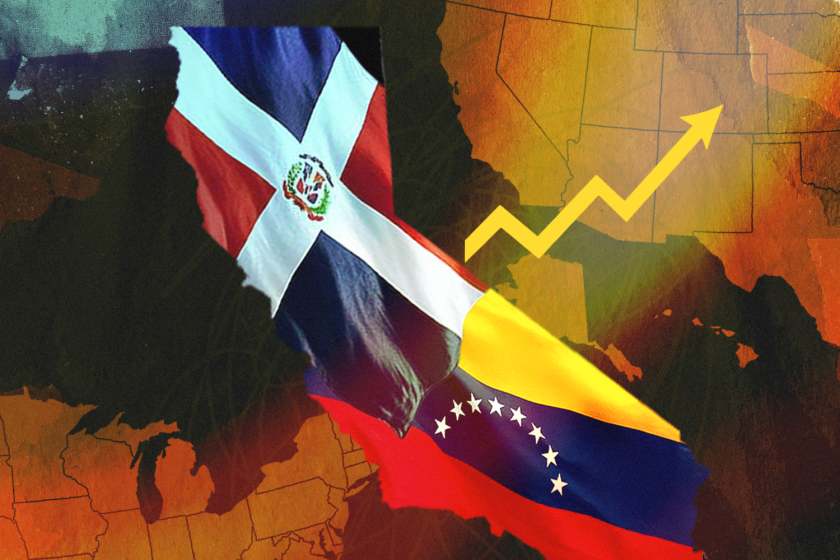
- Share via
A few years back, my siblings and I began what would turn out to be a long, somewhat arduous conversation: What’s going to happen with Mom? Our mom was getting older, and we needed to start thinking about what her golden years would look like, considering the possibilities that could come with caring for an elderly parent. In particular, our incredibly stubborn, often gullible, wanton spender of a mother.
The entire exercise, thus far, has led to arguments and a sense of straying further from the light, especially because my mom doesn’t have an accurate understanding or pragmatic approach to money.
Money, once in her possession, doesn’t stay there long, especially if there’s a clearance sale at Chico’s, a nearby casino or a questionably reliable friend of a sketchy cousin who has a timeshare in Puerto Vallarta.
With the help of Latina therapists, first-generation women are laying down boundaries and addressing unhealthy family dynamics, but it can sometimes feel like thankless work.
In the U.S. the average age of retirement is 65 for men and 62 for women. But when retirement is possible for Latinos depends on several factors, including a person’s health, lifestyle, the amount of savings they have and where they live. Those factors can vary wildly within immigrant and first-generation communities that deal with issues like environmental racism, barriers to healthcare, gentrification, wage inequality and more.
Along with his siblings, Rodolfo Acosta, who runs federal TRIO programs at UC Irvine and lives in Commerce with his wife and two daughters, supports his parents financially. They moved their parents into a senior apartment complex and split their rent and some of their bills, but “for the long term, that’s a bigger conversation that we’re trying to have.”
Both parents worked blue-collar jobs, as Acosta put it, earning their wages working in farms and factories. However, their immigration status places a barrier to their retirement.

“They never really had retirement benefits because they’re undocumented,” he said. “They paid Social Security and retirement, but they can’t really pull that back.” That’s because folks here without authorization are not eligible to receive Social Security benefits, even if they’ve paid taxes.
According to a report on California’s aging immigrant workforce, the state’s migrant workforce in 2019 was 2,984,821, with 1,253,625, lacking legal work documents. A high percentage of those individuals were over 50, many over 75. As that population ages, and can no longer work, it puts them at serious risk of living in extreme poverty, and that places a massive responsibility on their children and even grandchildren.
Acosta planned to sell his house and get something with an ADU. But the current housing marking has put that on hold indefinitely. Acosta and his family discussed moving to another state that offers healthcare for all and setting up their parents in Mexico, where they’re from, but for Acosta, that would mean losing the closeness his girls can have to their grandparents and an important part of their roots.
How do you compassionately get rid of the things your immigrant parents hold onto that are piling up in their home?
Culturally, we tend to be our parents’ retirement plan, in one way or another. Especially if their circumstances all but make retirement impossible.
A 2013 report titled “Race and Retirement Insecurity in the United States” found that Latinos are less likely to be covered by an employer retirement plan, like a 401(k), and have lower retirement savings, with 4 out of 5 Latino households holding less than $10,000 in retirement savings.
“There’s a generation above us that are still working hard. They never were able to get a home, and they really can’t do much but depend on us,” Acosta added. “In the Latino culture, it’s a debt of gratitude for a lot of the work that they did that we have to give back. Putting folks in a retirement home, it’s almost out of the question. I would feel really awful.”
It’s hard enough, but seems even harder now when everything is so expensive. That means many millennial, Gen X and even Gen Z children of Latino parents have had to step up in supporting their parents as they enter retirement age.
Latinos are less likely to be covered by an employer retirement plan, like a 401(k), and have lower retirement savings, with 4 out of 5 Latino households holding less than $10,000 in retirement savings.
For Alexis Tirado, a senior director at WORTHI, a multicultural marketing and publicity company based in L.A., that meant taking on her parents’ mortgage and providing cash support every month.
“Recently, I’ve had to set boundaries with my parents about financial support and what’s realistic versus just handing them money like I’m a cash cow,” said Tirado, whose parents emigrated from Puerto Rico and El Salvador and worked in the U.S. as a chauffeur and housekeeper. “I want to help them. I want them to live their best life. But I have to balance it with my life and my own family.”
New U.S. census data analyzed by the San Francisco Chronicle show California’s Hispanic populations are changing.
It’s been challenging to strike that balance, especially when it was one of Tirado’s biggest dreams to take care of her parents one day. Navigating that is “tricky,” she says, when her father doesn’t make sound financial decisions with the money she provides.
“At a certain point in your career for kids of immigrants, your paycheck is going back home. When I’m looking at my career, my salary, it’s not for me,” Tirado said. “If I had a [choice] between my dream house in Los Angeles or to have my parents have their dream retirement, hands down, I would take the retirement for my parents.”
Explaining the weight of gratitude Latino kids carry and the cultural reverence of our elders (even the ones who don’t deserve it) sets the expectation of care for the rest of their lives.
Roxana, a freelance writer based in San Diego who asked that her last name not be used to protect her parents’ identities, has been her mother’s primary caretaker since she was an undergraduate student in 2012. Her mom took on the role of her own mother’s care after she was diagnosed with Alzheimer’s and dementia. But since Roxana’s grandmother’s passing 10 years ago, her mom hasn’t worked and has not done much to find a job in Tijuana where she lives and can work (her mom can’t cross into the U.S.). As Roxana put it, any bit of income would help, especially as she’s the only child and her mom is single.
“It’s just a tough situation to navigate with somebody who’s very stubborn and also older,” she told me. “I don’t want to put restrictions on her, because I feel like I owe her a lot. But at the same time, I feel like she’s impeding my growth financially and also my career.”
Roxana admits to feeling resentment toward her mom, who she feels could have done more to plan for her retirement, and also tends to splurge when she does have money.
Kali Uchis discusses pregnancy, breaking industry barriers and new Spanish-language album ‘Orquídeas’
Kali Uchis is pregnant. The Grammy-winning artist discusses becoming mother—literally—and how she pen palled with Latin music’s biggest stars to make her new album “Orquideas.”
“My mom had 40-plus years to make a nest egg for herself too,” she said. “She speaks English. She went to college partly so I’m in this flux of guilt and resentment for having to be somebody’s parent, when I’m barely an adult myself even though I’m in my 30s. I don’t feel like I can fully tell her how I feel without it severely affecting our relationship.”
We all want the best for our parents, but the reality is what we think is best isn’t necessarily what they want, but what they want isn’t necessarily what’s possible. That already difficult, even treacherous ground, is made even more so by the discomfort and frustration that come with the reversal of roles — the child becoming the caregiver, and vice versa.
But those conversations are necessary, and ultimately, all we want to do is give our parents everything we can. “I would potentially sacrifice more of an investment on my own legacy retirement to buy me two, three, four extra days with them,” said Acosta.
Alex Zaragoza is a television writer and journalist covering culture and identity. Her work has appeared in Vice, NPR, O magazine and Rolling Stone. She’s written on the series “Primo” and “Lopez v. Lopez.” She writes weekly for De Los.
More to Read
The Latinx experience chronicled
Get the Latinx Files newsletter for stories that capture the multitudes within our communities.
You may occasionally receive promotional content from the Los Angeles Times.










